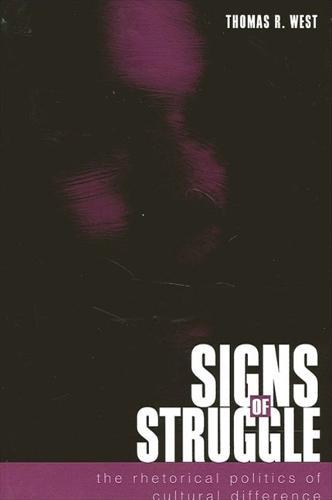Full Product Details
Author: Thomas R. West
Publisher: State University of New York Press
Imprint: State University of New York Press
Dimensions:
Width: 15.20cm
, Height: 2.50cm
, Length: 22.90cm
Weight: 0.345kg
ISBN: 9780791452974
ISBN 10: 0791452972
Pages: 163
Publication Date: 21 February 2002
Audience:
College/higher education
,
General/trade
,
Undergraduate
,
Postgraduate, Research & Scholarly
Format: Hardback
Publisher's Status: Active
Availability: In Print

This item will be ordered in for you from one of our suppliers. Upon receipt, we will promptly dispatch it out to you. For in store availability, please contact us.
Reviews
""This book should inspire reflection in our own classroom practices and research projects and introduce students to the power and depth of our differences. As the struggle over power continues, West provides a signal for changing our destination."" - Rhetoric & Public Affairs ""This is a smart, incisive, and constructive examination of how rhetoric, composition, culture, and politics intersect in important, sometimes troubling, always significant ways."" - From the Foreword by Gary A. Olson ""West provides cogent analyses of the debate in cultural/critical theory on race, gender, and affect, and gives some useful and timely insights into ways to approach the idea of safe houses, culture, and negotiation. He moves with deft ease among the theoretical arguments about difference, all the while clearly in command of their nuances, which enables him to draw out the insights he provides on the multicultural rhetoric of difference."" - Bruce Horner, author of Terms of Work for Composition: A Materialist Critique ""By refusing the rubrics of diversity and multiculturalism, West shows us that efforts to engage difference have too often collapsed into compositions of the familiar, grounded in the ironic topoi of authority-pluralism, rationalism, consensus, tolerance, civility. ...We can wait for someone or something to carry us back where the footing is sure so that we may patrol the boundaries of our own understanding, or we can stand frozen, paralyzed by the likelihood that habituation will push back or absorb the unfamiliar as we move outward. The great value of Signs of Struggle is that West encourages us to make the most implicit of our ground rules explicit, not simply as an intellectual exercise, but to recognize the cost of not doing so."" - From the Afterword by Peter Vandenberg
This book should inspire reflection in our own classroom practices and research projects and introduce students to the power and depth of our differences. As the struggle over power continues, West provides a signal for changing our destination. - Rhetoric & Public Affairs This is a smart, incisive, and constructive examination of how rhetoric, composition, culture, and politics intersect in important, sometimes troubling, always significant ways. - From the Foreword by Gary A. Olson West provides cogent analyses of the debate in cultural/critical theory on race, gender, and affect, and gives some useful and timely insights into ways to approach the idea of safe houses, culture, and negotiation. He moves with deft ease among the theoretical arguments about difference, all the while clearly in command of their nuances, which enables him to draw out the insights he provides on the multicultural rhetoric of difference. - Bruce Horner, author of Terms of Work for Composition: A Materialist Critique By refusing the rubrics of diversity and multiculturalism, West shows us that efforts to engage difference have too often collapsed into compositions of the familiar, grounded in the ironic topoi of authority-pluralism, rationalism, consensus, tolerance, civility. ...We can wait for someone or something to carry us back where the footing is sure so that we may patrol the boundaries of our own understanding, or we can stand frozen, paralyzed by the likelihood that habituation will push back or absorb the unfamiliar as we move outward. The great value of Signs of Struggle is that West encourages us to make the most implicit of our ground rules explicit, not simply as an intellectual exercise, but to recognize the cost of not doing so. - From the Afterword by Peter Vandenberg
Author Information
Thomas R. West is Assistant Professor of English at the University of South Alabama.




